Hemp oil is derived from the pressed seeds of the cannabis sativa plant and is used as a nutritional supplement thanks to its high levels of omega 3 fatty acids, strong antioxidant activity, and the presence of small amounts of unique compounds like cannabidiol (CBD).
Though it’s derived from the same plant species as marijuana, it’s not psychoactive, as the THC content of hemp seeds is practically zero.
If you are looking for health benefits from omega 3s plus some extra antioxidant power, hemp oil is a great product.
Looking for the best-quality hemp oil? Our researchers have reviewed and ranked the ten best hemp oils on the market right now.
Research
Rankings
1. Nutiva Hemp Oil
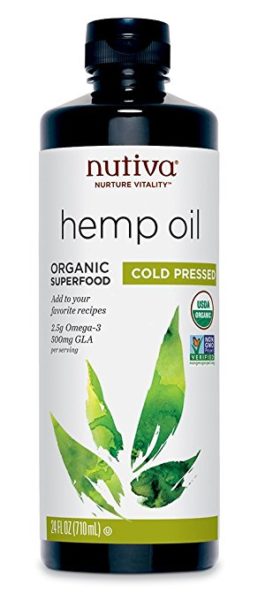
Nutiva Hemp Oil is certified organic and contains just one ingredient: raw, unfiltered, and cold-pressed hemp seed oil.
It’s the best option on the market if you want a liquid based hemp oil supplement that maximizes the antioxidant content and minimizes the possibility that pesticides or contaminants will end up in your hemp oil.
2. Manitoba Harvest Hemp Oil
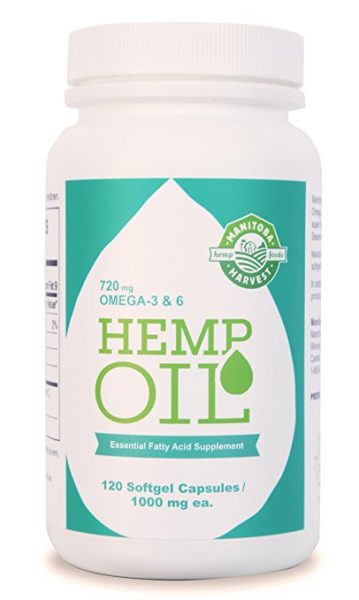
Need a capsule-based source of hemp oil? Manitoba Harvest has you covered.
These gelatin-based hemp oil supplement deliver 1000 mg of hemp oil each, without much in the way of extraneous ingredients.
Manitoba Harvest even provides a breakdown of the omega 3, omega 6, and omega 9 fatty acids, making it easy to calculate your omega fatty acid ratios with this supplement.
It’s a great solution if you don’t want to bother with measuring out your own liquid doses of hemp oil.
3. Zatural Hemp Oil
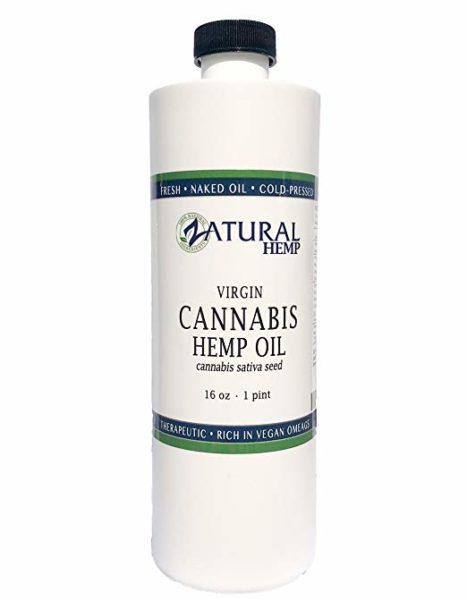
Zatural Hemp Oil comes from raw, cold-pressed hemp seeds and has no ingredients other than hemp oil. It’s a very solid runner-up for all-purpose usage.
4. Sky Organics Hemp Seed Oil

Sky Organics Hemp Seed Oil is the perfect fit if you want a hemp seed oil that’s optimized for cosmetic use. This hemp oil is organically grown, cold-pressed, and comes in a large eight ounce bottle that makes it easy to apply to skin or hair.
Other options are better if you only want a consumable hemp oil, but if you want to take advantage of the moisturizing and rejuvenating properties of hemp oil, Sky Organics Hemp Seed Oil is worth a look.
5. Sweet Essentials Virgin Hemp Seed Oil
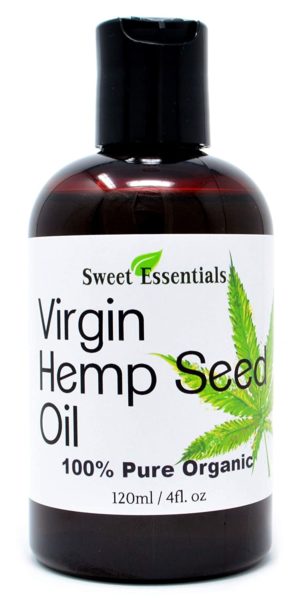
Sweet Essentials Virgin Hemp Seed Oil is a pure and organically-grown hemp seed oil that’s imported from Canada.
While it is primarily intended for cosmetic uses, it’s nevertheless technically “food grade” so you can also consume it. Still, most users of this hemp oil product tend to focus on its ability to rejuvenate skin and hair.
6. New Age Hemp Oil
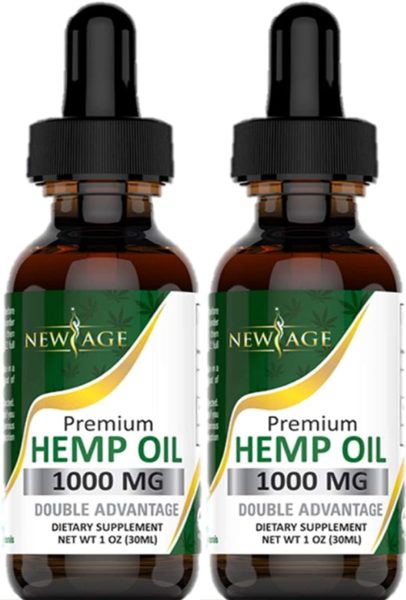
New Age makes a popular, travel-sized hemp oil supplement that comes in a one-ounce bottle.
New Age adds peppermint oil for a more crisp and cool scent and sensation, though purists looking for a 100% hemp oil would rather not have additives like this.
7. Healpark Hemp Oil
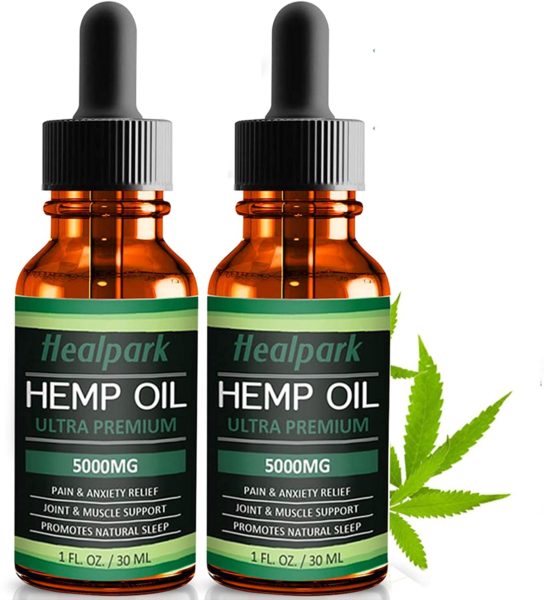
Healpark Hemp Oil is another small and easily portable hemp oil supplement that is high in purity, but low in volume. It’s a solid choice, but only if you use hemp oil sparingly.
8. Nature’s Beneficials Hemp Oil
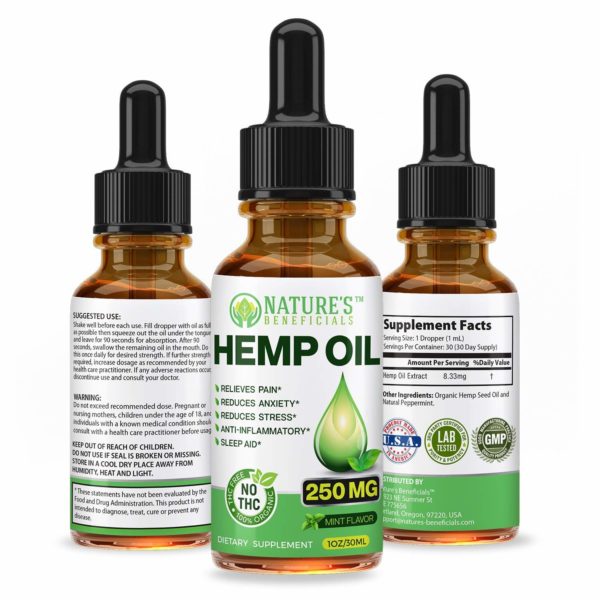
Nature’s Beneficials Hemp Oil uses the familiar blend of hemp oil and peppermint oil to improve taste and scent. Aside from this feature, it doesn’t really distinguish itself much from its competitors, making it hard to rank any higher.
9. Hemp King Ultra Premium Hemp Oil
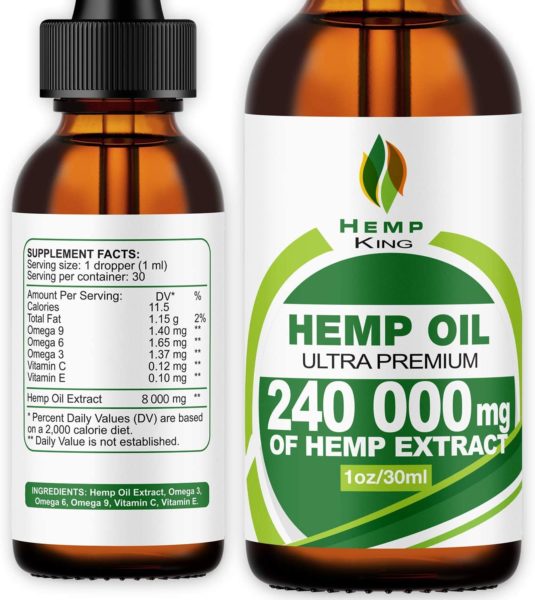
Hemp King Ultra Premium Hemp Oil uses organically grown hemp seed oil in its production and comes in a small amber glass vial with an eyedropper top.
The primary disadvantage of this hemp oil product is its small size: it’s not the greatest for skin use, hair use, or for pain that’s spread over large areas.
10. Hemp West Hemp Oil
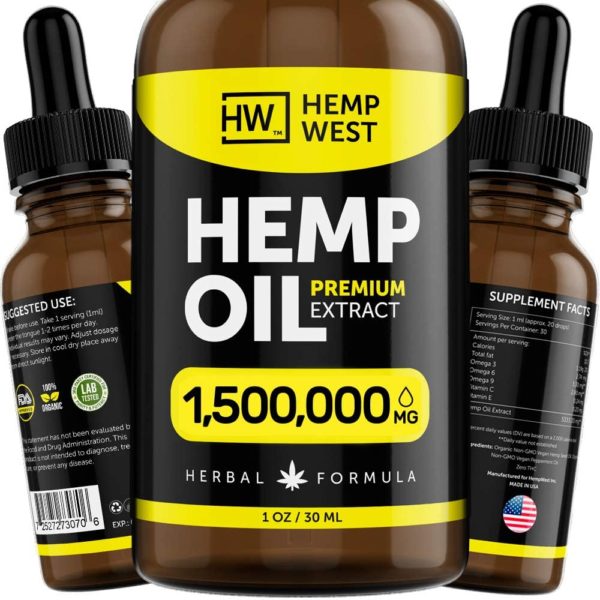
Hemp West organic extra strength Hemp Oil product is vegan friendly and comes in a 30 ml amber bottle with dropper.
This product also contains peppermint oil for the cooling effects so if you’re looking for purity this product is not for you.
Category winners
Best hemp oil overall: Nutiva Hemp Oil
Nutiva is certified organic, packaged in a UV-resistant opaque bottle, and cold-pressed, all of which mean it delivers a maximal dose of antioxidants. For all-purpose use, there’s no better option.
Best hemp oil for inflammation: Nutiva Hemp Oil
Nutiva’s organic certification and minimal processing make it our top recommendation for inflammation. By harnessing the antioxidant power of hemp oil, Nutiva is a great choice for battling inflammation.
Best hemp oil for skin: Sweet Essentials Virgin Hemp Seed Oil
Sweet Essentials is perfect for skin thanks to its tilt-top bottle, which makes it easy to dispense the right amount. The small volume isn’t a big deal if you are only dealing with small areas of dryness or irritation.
Best hemp oil capsules: Manitoba Harvest Hemp Oil
Don’t like the taste (or aftertaste) of hemp oil? Manitoba Harvest makes a 1000 mg gelatin-based hemp oil capsule that’s the perfect fit for you.
Best hemp oil for pain: Nutiva Hemp Oil
If you’re using hemp oil for pain, you want to go with an oil that’s got highly concentrated antioxidants. Nutiva fits the bill thanks to its organic certification and cold-press process. You can take it orally, or apply it directly to your skin.
Best hemp oil for sleep: Manitoba Harvest Hemp Oil
Manitoba Harvest is a great pre-bed supplement to help ensure deep, soothing sleep. The dosage is solid and there’s no hemp aftertaste, making it an easy call for better sleep.
Who should buy hemp oil?
Hemp oil is safe for most individuals looking to improve their nutrition and enhance their food flavor. Persons trying to manage to lose weight should only use hemp oil in moderation since it is high in calories.
Hemp oil is not researched thoroughly enough to be considered safe for special populations such as pregnant or nursing women and children.
How we ranked
When looking at hemp oils, the first thing on our list was purity. Hemp oil has a very low THC content compared to its cousin, marijuana. It’s imperative for your health and legality that all hemp oil you purchase and consume contains 0.3% THC or less – which is why only those brands, like Nature Driven and Nature’s Beneficials, made our top 10. Furthermore, organic-certified hemp oil, like Hemp Garden, got extra points since this helped avoid any trace pesticides and chemicals.
We also looked at the extraction process of hemp. We did not include hemp oils that were produced using chemical solvents like hexane or butane as they are neurotoxic in the body. We also chose not to include ethanol extraction as this method may damage some of the more delicate plant phytochemicals.
The extraction processes we did include are CO2 and cold-pressed. CO2 extracted hemp oil, uses highly pressured carbon dioxide to separate and maintain the broad array of beneficial compounds in hemp oil, with no chemical residues. Cold-pressed hemp oil was our top choice, and uses a modern steel press and helps the hemp oil maintain complete nutritional and flavor profiles. This is why Nutiva ranked first on our list.
Benefits
Hemp oil has a broad range of biologically active compounds. Hemp oil is a rich source of omega 3 fatty acids, potent antioxidants, and contains trace amounts of additional beneficial compounds like CBD oil.
In addition to its health benefits, hemp oil can be used to improve skin conditions like eczema and reduce skin dryness and itching.
Hemp oil contains high levels of omega 3 fatty acids and antioxidants. Omega 3 fatty acids are perhaps best known as the primary constituent of fish oil, but there are plenty of vegan sources of omega 3.
Hemp oil is a particularly rich source of these healthy oils, which have been connected with benefits ranging from resistance to chronic diseases to better cognitive functioning.
One scientific review article in the European Journal of Lipid Science and Technology analyzed the range of beneficial ingredients in hemp oil from a health perspective (1).
The fat content of hemp oil is up to 80% unsaturated fats, which have beneficial effects on cardiovascular disease. According to the authors, there are also a high amount of tocopherols, which have potent antioxidant activities.
Research in rats has demonstrated that the high polyunsaturated fat content of hemp oil can be protective against cardiovascular injury: when rats who were fed hemp oil were exposed to a transient loss of blood supply to their hearts, they sustained less damage than a similar group of rats that had not been fed hemp oil (2).
Hemp oil may improve risk factors for cardiovascular disease. Additional research has explored the cardioprotective effects of cannabis oil more directly.
A review study on the use of hemp oil for improving cardiovascular health was published in 2010 in the journal Nutrition and Metabolism (3).
The review examines the findings of dozens of studies on how the constituents of hemp oil interact with various risk factors for cardiovascular disease, like systemic inflammation or cholesterol levels.
While few of these studies examined the benefits of hemp oil directly, there is quite a bit of indirect evidence that hemp oil can be beneficial when consumed on a regular basis.
For example, numerous studies have shown that diets that are high in linoleic acid can lead to lower levels of LDL (“bad”) cholesterol while maintaining high levels of HDL (“good”) cholesterol (4), and hemp oil itself is quite high in linoleic acid.
Hemp oil can improve skin conditions like eczema. Like other plant oils such as coconut oil, hemp seed is occasionally used for cosmetic purposes as well as health purposes.
However, some research suggests that consuming hemp oil orally might actually benefit skin (instead of having to apply it directly to your skin).
A study published in 2005 in the Journal of Dermatological Treatment by researchers in Finland compared a hemp oil supplement to an olive oil supplement over the course of 20 weeks in a group of subjects with eczema (5).
The results showed that the people receiving hemp oil fared better in terms of their dryness, itchiness, and their frequency of using other products like moisturizers to treat their skin.
The subjects also had higher levels of unsaturated fatty acids in their blood after using the hemp oil supplement, which suggests that these two outcomes could be connected: higher levels of healthy fats in your blood might be directly related to better skin health.
Side effects
Hemp oil is not much different in its tolerability than other seed oils like olive oil or grapeseed oil. However, there are a few finer points to consider when it comes to hemp oil.
First, in rare cases people have reported testing positive for cannabis use as a result of consuming hemp oil.
Today, most hemp oil products are strictly monitored to ensure they are free of THC (the active compound in marijuana), but nevertheless it’s hypothetically possible that regular hemp oil use could cause a false positive on a drug test.
A 1997 article in the Journal of Analytical Toxicology conducted a controlled experiment with two individuals known to be non-cannabis users (6).
The researchers conducted an initial drug test, which came back negative, then had the study participants take a hemp oil supplement.
One took a low dose for one month, while the other took a high dose once. The subjects were drug-tested again, and both tested positive.
While this has no negative health implications, strictly speaking, it’s still worth considering as a hypothetical side effect.
Hemp oil has also caused problems when used by small children. One case report describes a two-year-old who developed mild cannabinoid poisoning after taking a hemp oil supplement for several weeks on the advice of the family pediatrician (7).
While tiny amounts of psychoactive compounds in hemp oil pose no problems for adults, this report suggests that small children should not take hemp oil.
Recommended dose
Since hemp oil is a product that has only come to prominence recently (blame that on draconian and outdated laws that heavily restricted its uses until recently, due to the fact that it comes from the same plant species that marijuana comes from), there are few guidelines on appropriate dosage levels.
One study investigated a dose of two grams per day of hemp seed oil, but found no benefits on any biomarkers related to cardiovascular health (8).
This might suggest that doses of greater than two grams per day, or for a longer period of time, might be necessary to achieve the benefits of hemp oil.
Alternatively, because this study only had 20-22 people in each group, it’s possible that it was just too small to detect the effects of hemp oil.
Regardless, given the strong safety profile of hemp oil, a higher dose range than used in this study isn’t a bad idea. Hemp oil can be pretty fragile, chemically speaking, so store it in a cool, dark place to prevent oxidation of its unsaturated fatty acids.
The best hemp oils all come in amber glass or opaque plastic containers to protect against damage from visible and ultraviolet light.
FAQ
Is there a difference between CBD oil and hemp oil? The most significant difference between hemp and CBD oil is the part of the cannabis plant in which each comes from. Hemp oil comes precisely from the seeds of the cannabis plant, while CBD oil is a byproduct of the leaves, stalks, and flowers of the cannabis plant. Additionally, hemp oil typically comes from the hemp plant, which is a different type of cannabis plant than the type that is used to create marijuana-based products.
How do CBD oil effects differ from hemp oil? The effects that each of these products has on the body vary greatly. Hemp oil has a lower cannabinoid content than CBD oil and has more of a nutritional use, as compared to CBD oil’s typical usage as a medicinal treatment method. Hemp oil is more effective as a nutritional supplement, as it provides healthy fatty acids and antioxidants. CBD oil is more commonly used to aid in the relief of symptoms associated with many diseases and conditions. The THC content of hemp oil is also required to be below 0.3%, making the potential psychoactive effects practically nonexistent.
Does hemp oil make you sleepy? On its own, hemp oil is not likely to make you sleepy, or assist with insomnia and other related sleep disorders. Positive sleep effects are more commonly associated with CBD oil rather than hemp oil. As such, when hemp oil is combined with CBD oil, the solution could lead to increased sleep quality at night and reduced symptoms of insomnia and other sleep conditions. There is a small chance that you may experience fatigue after using pure hemp oil on its own, but this is not guaranteed.
What exactly is hemp? Hemp is a variation of the cannabis plant that is used for its ability to create fibers in commercially-sold items. These items include food, paper, clothing, and any other item that requires a fiber-like material to develop. Though there are still trace amounts of cannabinoids like THC and CBD in hemp, the levels are much lower than other variations of the cannabis plant, which makes hemp a great alternative. Hemp is also used as a primary ingredient in some foods and beverages, including beer, milk, and juice.
What is hemp oil made from? Hemp oil comes from the hemp plant, which is not of the same strain of the cannabis plant that people are referring to when discussing marijuana products. The oil itself comes from pressed hemp seeds.
When does hemp oil expire? Like most items, the shelf-life of hemp oil is longer when the product is left unopened. When stored properly, an unopened container of hemp oil may last one or two years. To extend the shelf-life, it’s recommended that you store your hemp oil in a cool, dry location that is not exposed to direct sunlight. Not doing so could cause your hemp oil to go bad or lose quality. Once opened, you can refrigerate your hemp oil to preserve it for longer.
Is hemp oil legal? With the passing of new legislation nationwide, each state has its own legal stance on cannabis and the products made from the plant (hemp oil, CBD oil, etc.). Generally speaking, hemp products with a THC level below 0.3% are considered legal in the United States. It is important to remember that the legality of CBD oil and marijuana products does vary state to state, and you should check the legal status of these products in your state before purchasing and using them.
Is hemp oil safe? After sufficient research in recent years, there have been very few health consequences associated with hemp oil. That being said, some side effects include diarrhea, fatigue, or dry mouth. However, these are relatively rare and should not be expected when using hemp oil. When produced to the standards set by the United States government, hemp oil should have a maximum of 0.3% THC, which severely limits the adverse effects that you might encounter when using products like CBD oil or marijuana.
Where can you buy hemp oil? Hemp oil and other hemp products are widely available with the passing of federal legislation regarding the legality of the products. Hemp oil is available for purchase at most health and wellness stores, hemp-related distributors, and even mainstream retailers like Walmart and Amazon.
Is hemp oil bad for you? Hemp oil isn’t bad for you, but it is often confused with CBD oil, which produces entirely different effects on the bod – that can be bad for you. Due to the low THC level found in hemp oil, there are no real negative side effects of the substance. CBD oil, on the other hand, has been linked to side effects like nausea, digestive issues, and mood irregularity.
Does hemp oil help with pain? While still relatively understudied, there has been a researched link between hemp oil and pain reduction. Additionally, hemp oil can also be used to reduce pain, soreness, and muscle tightness post-workout. Though hemp oil should not be your only method of treating pain (especially severe pain), it does have great potential.
Is hemp oil addictive? Because hemp oil has a THC level below 0.3%, there is less of a chance to develop a chemical addiction to the substance. In comparison, many strains of marijuana products have a THC level of over 50%, which can result in addiction for some people. At the end of the day, hemp oil is generally viewed as non-addictive and safe.
Can you become addicted to hemp oil, even if it has no THC? Though the lack of THC reduces the likelihood of developing an addiction, it is still possible to become psychologically. In circumstances where you notice that your use of hemp oil has led to positive health benefits, you may subconsciously become addicted to the possibilities of improving your health. Like any health product or supplement, the best thing you can do is try to limit your intake to the recommended value and keep an eye on your relationship with the product.
Is hemp oil the same as marijuana? Hemp oil and marijuana come from the same plant and have some similar characteristics in terms of chemical composition. However, they are two entirely different products. Cannabinoids are chemicals found within the cannabis plant that substantially modify the release of neurotransmitters in the brain.
Some of the more common cannabinoids in the cannabis plant are THC and CBD. Similar to cannabis, hemp oil reportedly also may contain THC and CBD, as well as more than 30 other cannabinoids. It is important to note that the cannabinoids that remain in hemp oil products are in trace amounts and will not produce a “high” effect in users (9).
Can hemp oil be used for cooking? Hemp oil can be used in cooking and added to food to provide a nutty flavor. While you can add hemp oil to top off a bowl of rice, you can also use hemp oil to make sauces, dips, and dressings. It is recommended that you do not use hemp oil as an alternative to other oils (like olive or canola) to cook food, as the substance burns somewhat quickly and will affect the outcome of your food.
Can hemp oil be ingested? One of the more common methods of using hemp oil is using the dropper to put one or two drops beneath the tongue and then swallowing it afterward. It is also not uncommon to consume hemp oil by the teaspoon, with a recommendation of one to two teaspoons per day.
Hemp oil can also be used topically on the skin, swallowed in the form of a capsule, or inhaled through vape products. Hemp oil can be used as an ingredient in a meal, more commonly used as an ingredient in dips, dressings, or sauces.
Can hemp oil be used to treat cancer? Technically no, hemp oil cannot be used to treat cancer. However, hemp and CBD oil can both be used to reduce the negative symptoms associated with some cancers. One of the identified effects of hemp oil is mild pain relief, which can prove extremely beneficial to those with cancer. When paired with CBD oil, the benefits for cancer patients are even more extraordinary. The combination of the two substances can lead to increased appetite and assistance with sleep.
Consumption of hemp oil is also somewhat connected to the prevention of cancer. The primary reason for this is the fact that hemp oil includes antioxidants, which are known to prevent the development of degenerative diseases like cancer.
What is hemp oil good for? In recent years, hemp oil has become increasingly popular as a treatment for the unfavorable symptoms of many diseases and conditions. Hemp oil has also been attributed with having exceptional nutritional value, including a healthy amount of vitamins and minerals. In particular, hemp oil has exceptional levels of omega-3 and omega-6 fatty acids as well as antioxidants. Whether or not using hemp oil has diminished your side effects of symptoms of other conditions, you are still intaking a nutritious substance. When just considering the nutritional value of hemp oil, the nutrients provided can be beneficial for the health and wellbeing of the heart, brain, and skin.
Can hemp oil help to treat disease? The chemical attributes of hemp oil and other hemp products have proven beneficial in possibly treating and preventing cancers, gastrointestinal issues, and neurological disorders. Some studies have shown that supplementing with hemp oil may reduce cancerous cells within the body and improve wellbeing, such as increased appetite and energy levels (10, 11).
Hemp oil is also relatively conventional for treating skin disorders like acne, bacterial infections that could cause pneumonia or further infection, and hormone-related conditions in women.
Can you get high from hemp oil? No matter how you consume hemp oil, or how much you consume, there is almost no chance that you will experience a “high” from hemp oil; unless the substance is combined with a product that does cause these effects. The primary reason for this is the lack of THC in hemp oil, which is the cannabinoid that contributes to the “high” feeling.
What are the benefits of using hemp oil on the skin? Hemp oil, when used topically, can be used to treat several skin conditions, including acne and eczema. Many reports also show that using hemp oil on the skin can improve your skin’s moisture level and reduce dryness in the skin.
Can you drink hemp oil? While it isn’t recommended that you drink hemp oil straight, you can certainly do it in small doses. Hemp oil is also used in a variety of beverages, including milk, juices, and beer.
Related Articles
Recap
Hemp oil is a great source of vegan omega-3 fatty acids, which have beneficial effects on your cardiovascular system. It’s also a rich source of antioxidants thanks to its high tocopherol content.
Its moisturizing and rejuvenating properties also help improve skin conditions like eczema, even when it’s consumed orally as opposed to being applied to the affected skin.
Current dosing recommendations are sparse, but it looks like your daily consumption should be somewhere above two grams per day. Hemp oil should be stored in a cool, dark, place.
While high-quality hemp oils are free of THC, it’s hypothetically possible to have a positive drug test due to regular hemp oil consumption, and small children should not take hemp oil.
With these minor caveats, hemp oil is an excellent source of both healthy fats and antioxidants and can be easily added to your diet or supplementation routine.
For BodyNutrition’s #1 hemp oil recommendation, click here.